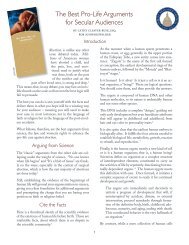The Effects of Divorce on Children - Family Research Council
The Effects of Divorce on Children - Family Research Council
The Effects of Divorce on Children - Family Research Council
You also want an ePaper? Increase the reach of your titles
YUMPU automatically turns print PDFs into web optimized ePapers that Google loves.
F. <strong>Children</strong>’s Weakened Ability to Handle C<strong>on</strong>flict<br />
<str<strong>on</strong>g>Divorce</str<strong>on</strong>g> diminishes children’s capacity to handle c<strong>on</strong>flict. <str<strong>on</strong>g>The</str<strong>on</strong>g> difference between<br />
marriages that remain intact and those that end in divorce lies primarily in the<br />
couple’s ability to handle marital c<strong>on</strong>flict and move towards agreement. Parental<br />
modeling clearly diminishes many children’s capacity for stable marriage later in<br />
life, though some children may react by doubling their efforts to ensure stability.<br />
Percentage <str<strong>on</strong>g>of</str<strong>on</strong>g> Adolescents Who Got Into a Fight<br />
45.0%<br />
40.0%<br />
35.0%<br />
30.0%<br />
25.0%<br />
20.0%<br />
15.0%<br />
10.0%<br />
5.0%<br />
0.0%<br />
Ever Got Into a Fight by <strong>Family</strong> Structure<br />
28.8%<br />
32.3%<br />
36.7%<br />
MARRIED STEP TWO<br />
BIOLOGICAL<br />
PARENTS<br />
Source: Adolescent Health Survey, Wave I. Adolescents grade 7-12.<br />
42.6%<br />
ONE<br />
BIOLOGICAL<br />
PARENT<br />
39.5% 39.6%<br />
DIVORCED NEVER MARRIED<br />
For instance, compared to students from intact families, college students from<br />
divorced families use violence more frequently to resolve c<strong>on</strong>flict and are more<br />
likely to be aggressive and physically violent with their friends, male or female. 71<br />
In their own marriages, children <str<strong>on</strong>g>of</str<strong>on</strong>g> divorced parents are more likely to be<br />
unhappy, to escalate c<strong>on</strong>flict, to communicate less, to argue frequently, and to<br />
shout or to physically assault their spouse when arguing. 72 Thus, the likelihood <str<strong>on</strong>g>of</str<strong>on</strong>g><br />
divorce is transmitted across generati<strong>on</strong>s. 73<br />
71 Robert E. Billingham and Nicole L. Notebaert, “<str<strong>on</strong>g>Divorce</str<strong>on</strong>g> and Dating Violence Revisited:<br />
Multivariate Analyses Using Straus’s C<strong>on</strong>flict Tactics Subscores,” Psychological Reports 73<br />
(1993): 679-684.<br />
72 Pamela S. Webster, Terri L. Orbuch, and James S. House, “<str<strong>on</strong>g>Effects</str<strong>on</strong>g> <str<strong>on</strong>g>of</str<strong>on</strong>g> Childhood <strong>Family</strong><br />
Background <strong>on</strong> Adult Marital Quality and Perceived Stability,” American Journal <str<strong>on</strong>g>of</str<strong>on</strong>g> Sociology<br />
101 (1995): 404-432.<br />
73 <strong>Research</strong>ers have found that the children <str<strong>on</strong>g>of</str<strong>on</strong>g> violent parents do better if their parents separate.<br />
However, if the parents’ c<strong>on</strong>flict is not violent or intense, their children fare better in their own<br />
marriages if their parents remain married. Obviously, the best soluti<strong>on</strong> for all c<strong>on</strong>cerned is that<br />
parents learn how to handle c<strong>on</strong>flict and to cooperate with each other, thereby restoring family<br />
harm<strong>on</strong>y.<br />
11




